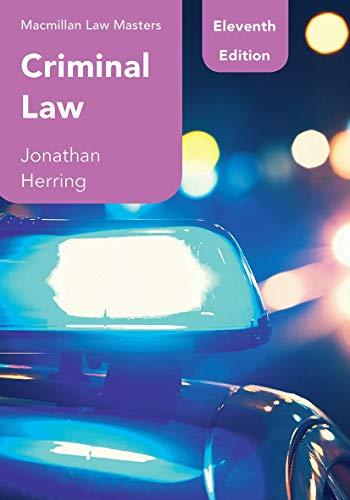Question
Case Study 1 Carlill v Carbolic Smoke Ball Company (1893)6 In nineteenth-century England, a company created a device called the Carbolic Smoke Ball that claimed
Case Study 1
Carlill v Carbolic Smoke Ball Company (1893)6
In nineteenth-century England, a company created a device called the "Carbolic Smoke Ball" that claimed to fight influenza. The manufacturer advertised that buyers who found that it did not work would get 100. The specific language of the advertisement was:
"100 reward will be paid by the Carbolic Smoke Ball Company to any person who contracts the increasing epidemic influenza colds, or any disease caused by taking cold, after having used the ball three times daily for two weeks, according to the printed directions supplied with each ball. 1000 is deposited with the Alliance Bank, Regent Street, showing our sincerity in the matter. During the last epidemic of influenza many thousand carbolic smoke balls were sold as preventives against this disease, and in no ascertained case was the disease contracted by those using the carbolic smoke ball."
Louisa Carlill saw the advertisement, bought one of the balls and used it three times daily for nearly two months until she contracted the flu. When Ms. Carlill tried to claim her 100 from the Carbolic Smoke Ball Company, they refused to pay her. She brought an action against the company, arguing that the advertisement and her reliance on it was a contract between her and the company. The company argued it was not a serious contract.
1) What contractual issues come up in this case?
2) Is this contract valid? Why or why not?
Case Study 2
Toronto Marlboros Junior A Hockey Club v Tonelli (1979)7
At the age of 16, John Tonelli signed a minor league contract to play for the Toronto Marlboros Junior A Hockey Club. His contract stipulated that he would have to play for the team until he was 20 years old and also contained a clause stipulating that if he joined a professional team, he would have to pay the Marlboros 20% of his earnings for the first few years. In exchange, the team, would groom him to become a professional player. Tonelli played well and got the attention of professional scouts. When he turned 18, he cancelled his existing contract and signed with a professional team in a higher league. The Marlboros sued him for breach of contract.
1) What contractual issues come up in this case?
2) Is this contract valid? Why or why not?
Step by Step Solution
There are 3 Steps involved in it
Step: 1

Get Instant Access to Expert-Tailored Solutions
See step-by-step solutions with expert insights and AI powered tools for academic success
Step: 2

Step: 3

Ace Your Homework with AI
Get the answers you need in no time with our AI-driven, step-by-step assistance
Get Started


